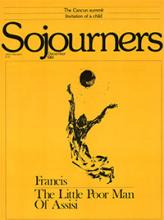Third Sunday in Advent
Luke 1:46-55; Isaiah 61:1-4,8-11
Long before the wilderness beckoned, or the lame were deposited at his feet, or the cross was in sight--even while he was being formed in the womb--his mother knew that the earth was about to be shaken.
The simple handmaiden comprehends the world's greatest mystery. Mary understands that hidden deep within her is a message of hope for a world aching for a Messiah. In the most ordinary and most miraculous event of birth, the world is being turned upside down.
Mary embodies the reversal that has already begun. The humble woman of low estate has been named most blessed. In potent words that might surprise those for whom the word meek comes to mind when picturing Mary, she announces the advent of a new day:
Lord, you have shown strength with
your arm, you have scattered the proud in the
imagination of their hearts, you have put down the mighty from their
thrones,
and exalted those of low degree; you have filled the hungry
with good things,
and the rich you have sent empty away. (Luke 1:51-53)
It all hangs on the first cry of a newborn baby. Cracks in a crude stable's walls let in the cold night air and release the warm and quiet cry that is the world's most significant birth announcement.
And in the unfolding of time, the son confirms the words of the mother. Grown to maturity, he announces his ministry. He stands in Nazareth among his people, in their synagogue, and reads from Isaiah 61:
The Spirit of the Lord is upon me, because the Lord has anointed me
to preach good news to the poor. The Lord has sent me to proclaim release
to the captives and recovering of sight to the blind,
to set at liberty those
who are oppressed, to proclaim the acceptable
year of the Lord.
Read the Full Article

